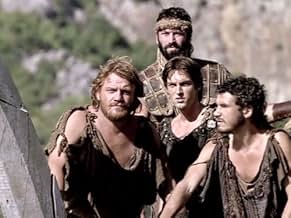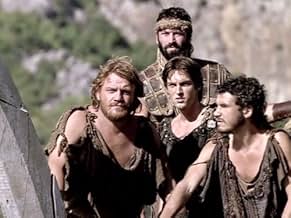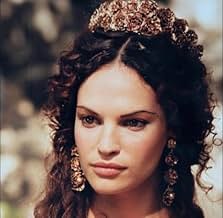IMDb RATING
6.0/10
5.9K
YOUR RATING
One of the most legendary adventures in all mythology is brought to life in an epic saga of one man's quest for the Golden Fleece, a gift from the gods.One of the most legendary adventures in all mythology is brought to life in an epic saga of one man's quest for the Golden Fleece, a gift from the gods.One of the most legendary adventures in all mythology is brought to life in an epic saga of one man's quest for the Golden Fleece, a gift from the gods.
- Nominated for 2 Primetime Emmys
- 10 nominations total
Browse episodes
Featured reviews
Nice and elaborate juvenile adventure based on The Argonauts 250 BC, written by Apolonio of Rodas, telling of the famous myth of Jason and his crew of derring-doers and their search for the Golden Fleece. As Jason, heir of the Iolco kingdom : Jason London, is aided or hindered by assorted whimsical Gods on Olympus, Zeus : August McFayden , and Hera : Olivia Williams, as he quests for the Golden Fleece. Along the way his father is killed by his evil uncle Pelias , Dennis Hopper in braids , who has taken the throne and usurped his inheritance. In order to reclaim it, Jason must retrieve the magical animal from distant Colchis and bring it to Pelias. Jason has to meet the blinded prophet Phineas : Derek Jacobi who knows the Fleece location, but he is continuously harassed by some winged demons or Arpias. As Jason assembles the ordinary motley crew : Hercules : Brian Thompson, Castor : Djalili , Polux : John Sharian , Orpheus : Adrian Lester, Argos himself : David Calder, all of them would-be heroes and set sail on the Argos for uncharted waters and numerous adventures to arrive in Colchis where governs a sinister king : Frank Langella who has two sons, the astute Aspyrtes : James Callis and the clairvoyant Medea : Jolene Blalock who falls for Jason . At the same time, Jason confronts rutless Amazons women : Natasha Henstridge, a corpulent bull, sword-wielding living plants and a giant dragon, among others.
Epic and mythological fare, fun for the whole family with several adventures, thrills, emotion, noisy action and the film itself is given an enormous boost thanks to computer generator special effects. As the impressive adventures are well recreated by superb FX with multitude of mythological creatures. As during his quest for the Golden Fleece Jason has to combat the giant Poseidon, a huge iron bull, winged she-devils and a dragon guarding the Fleece, this battle is the highlight of the movie. The gigantic mechanical bronze bull that Jason fights is an arthritic disappointment but most of the other inventions are pleasingly imaginative. Great fun, as these things go, with a colorful cinematography by Sergei Kozlov and a good musical score by Simon Boswell, to boot . The motion picture was professionally directed by Nick Willing.
This one is a TV rendition, there are other cinematic adaptations as The Giants of Thessaly 1960 by Riccardo Fedra with Ronald Carey, Ziva Rodann, Alberto Farnese, Tamberlani, Massimo Giroti. And the best : Jason and the Argonauts 1965 by Don Chaffey, including captivating FX, the actual stars of the movie, by master Ray Harryhausen with Todd Armstrong, Nancy Kovack, Jack Gwillin, Honor Blackman, Douglas Wilmer, Gary Raymond.
Epic and mythological fare, fun for the whole family with several adventures, thrills, emotion, noisy action and the film itself is given an enormous boost thanks to computer generator special effects. As the impressive adventures are well recreated by superb FX with multitude of mythological creatures. As during his quest for the Golden Fleece Jason has to combat the giant Poseidon, a huge iron bull, winged she-devils and a dragon guarding the Fleece, this battle is the highlight of the movie. The gigantic mechanical bronze bull that Jason fights is an arthritic disappointment but most of the other inventions are pleasingly imaginative. Great fun, as these things go, with a colorful cinematography by Sergei Kozlov and a good musical score by Simon Boswell, to boot . The motion picture was professionally directed by Nick Willing.
This one is a TV rendition, there are other cinematic adaptations as The Giants of Thessaly 1960 by Riccardo Fedra with Ronald Carey, Ziva Rodann, Alberto Farnese, Tamberlani, Massimo Giroti. And the best : Jason and the Argonauts 1965 by Don Chaffey, including captivating FX, the actual stars of the movie, by master Ray Harryhausen with Todd Armstrong, Nancy Kovack, Jack Gwillin, Honor Blackman, Douglas Wilmer, Gary Raymond.
Perhaps one of the upsides to viewing this miniseries is the opportunity to see pre-'Enterprise' Jolene Blalock as Medea, the female lead. The word "chameleon" comes to my mind when i compare her physical appearance in this to that in the Star Trek series.
I agree that the Harryhausen version set the standard but this was enjoyable viewing on its own merits inclusive of seeing Ms. Blalock before she assumed the role of T'Pol.
I agree that the Harryhausen version set the standard but this was enjoyable viewing on its own merits inclusive of seeing Ms. Blalock before she assumed the role of T'Pol.
It's a good indication of just how bad television is becoming when one spends four hours watching such reprehensible ineptitude as this. As a guy who has grown up with Greek myth since I could understand language it's difficult to express how insulted I was by this ludicrous film. Taking liberties with a storyline is one thing. Reinventing it to fit a Hollywood formula is something different: the inclusion of blacks and women among the Argonauts is inexcusable no matter what the producer's motives--not because Atalanta wouldn't have made a good Argonaut, but because she wasn't, and Orpheus was Greek, not Ethiopian. The involvement of Hercules for the entire voyage instead of for only part of the first stage like in the real legend is almost forgiveable after that. For all of that however, the biggest beef with "Jason and the Argonauts" is not that it leaves out huge slabs of the journey, makes up new parts and juggles characters to suit itself. In fact, it gets some parts right: sending the dove between the clashing rocks for example, and Jason's relationship to Pilias among little else. Overall, this film is just lame, a poor, typically made-for-television sham of a cracking good story, exploiting all the best bits for all their worth and completing omitting or changing others. For those who only know the legend from this film: Orpheus wasn't black, Atalanta wasn't an Argonaut, Medea was a cold-blooded conniving bitch who cut up her own brother and fed him to the sharks and Hercules quit the voyage early on to go searching for his gay lover who got spirited away by river nymphs. Let's hope that, one day, some film producer has the guts to tell this story the way is was supposed to be told--and maybe use Hercules' real Greek name (Heracles) to boot.
Being an unconditional admirer of Ray Harryhausen's and Don Chaffey's version of `Jason and the Argonauts' could be a disadvantage to fully enjoy this Hallmark mini-series. But surprisingly it has its own values to make it an enjoyable experience.
First I'd like to claim that I see no reason to diminish its merits because of its faithfulness or liberties regarding Greek mythology. This is cinema not literature, and it must be evaluated as a work of moving images. If judging a cinematic work according to literary precepts were the rule, then not even the 1963 film would endure this kind of judgment: as I remember it, Medea, for instance, was described as a high priestess not related to the royal family of Colchis. According to the faithful-to-literary-source approach, that would be enough to condemn the motion picture. On the other hand, I believe that `Jason 2000' was also inspired by cinematic tradition, not only by the 1963 production but other sources as well, as Marcel Camus' `Orfeu negro', and today's horror films. It was also inspired by our times: the reason to include a female Argonaut validates the role of women warriors, instead of being a feminist or `politically correct' concession.
One of the most interesting things about this version is its casting, resulting in the fact that the story is told from the point of view of very young people, with all their impetus and fragility. When most contemporary motion pictures portray aimless young persons, this series shows a purposeful youth, young people with a mission and who fulfill their destiny with passion. Such is the case of Jason, Medea, Acastus, Atalanta, Aspyrtes, Orpheus, Zetes, and most of the Argonauts. These are the real protagonists of the story. In their search for justice and love, they are helped or betrayed by their elders, be it gods (Zeus, Poseidon, and Hera who appears three times as an old peasant woman) or humans (Pelias, Aertes, Phineas).
It is inevitable to compare the film to its predecessor: concerning the gods, this time they seem more lustful and primitive than the Olympus portrayed in the 1963 film, with Nial McGinnis and Honor Blackman fighting over Jason's destiny. This time Hera and Zeus feel unequivocal sexual attraction towards Jason and Medea, respectively. Hera makes reference to Zeus' frolicking with humans, and that may please the Greek mythology purists. But their representations seem out of a detergent TV spot -clouds included- and the acting by Olivia Williams and, specially, by Angus MacFadyen do not help much. At least, in the original the naiveté of the gods seemed more apt to the story being told, than these two creatures who open the narration in awe, but close it with embarrassingly sexy foreplay.
Special effects are fine, but in some respects they do not surpass the Harryhausen creatures. A mechanic bull sound effects included- substitutes Talos, but the titan is evoked by the imposing height of a Poseidon out of `The Neverending Story'. The sequences of the dragon, the skeleton army and the harpies do not improve on the original ones. Compared to the seven-headed hydra, this dragon is rather silly (it falls awkwardly into a precipice that it has previously climbed with ease). The skeletons this time looking like mannequins grounded on earth- lack the grace of the mean originals. In spite of the work of the Jim Henson workshop, the whole harpies sequence lacks the dark and exciting atmosphere created by Harryhausen, Chaffey and Herrmann.
In this version, there are more exciting warring scenes and Jason finally claims his throne, but to make the story work for three hours the film is full of melodramatic gestures and dialogues, which alternate with the action. The writers added some `character development' with Freudian overtones taken from a Psychology 101 course, that give a little depth to the characters: it may work for Pelias, Polymele or Medea, but in the case of Jason, being an action hero, his uncertainty and doubts tend to diminish the empathy with the viewer. In other occasions, they are too tame or just do not make sense: did Aspyrtes have an incestuous relationship with Medea, or is he gay and jealous of Medea because of Jason? In this respect, direction of actors is very suggestive in many different scenes.
All this said, I think that the film has the same enthusiasm of the original; the search for the golden fleece is still fascinating no matter how much Greek mythology has been altered. In the final analysis, `Jason 2000' is an enjoyable mini-series, with a story of tyranny, greed and righteousness still relevant for our times.
First I'd like to claim that I see no reason to diminish its merits because of its faithfulness or liberties regarding Greek mythology. This is cinema not literature, and it must be evaluated as a work of moving images. If judging a cinematic work according to literary precepts were the rule, then not even the 1963 film would endure this kind of judgment: as I remember it, Medea, for instance, was described as a high priestess not related to the royal family of Colchis. According to the faithful-to-literary-source approach, that would be enough to condemn the motion picture. On the other hand, I believe that `Jason 2000' was also inspired by cinematic tradition, not only by the 1963 production but other sources as well, as Marcel Camus' `Orfeu negro', and today's horror films. It was also inspired by our times: the reason to include a female Argonaut validates the role of women warriors, instead of being a feminist or `politically correct' concession.
One of the most interesting things about this version is its casting, resulting in the fact that the story is told from the point of view of very young people, with all their impetus and fragility. When most contemporary motion pictures portray aimless young persons, this series shows a purposeful youth, young people with a mission and who fulfill their destiny with passion. Such is the case of Jason, Medea, Acastus, Atalanta, Aspyrtes, Orpheus, Zetes, and most of the Argonauts. These are the real protagonists of the story. In their search for justice and love, they are helped or betrayed by their elders, be it gods (Zeus, Poseidon, and Hera who appears three times as an old peasant woman) or humans (Pelias, Aertes, Phineas).
It is inevitable to compare the film to its predecessor: concerning the gods, this time they seem more lustful and primitive than the Olympus portrayed in the 1963 film, with Nial McGinnis and Honor Blackman fighting over Jason's destiny. This time Hera and Zeus feel unequivocal sexual attraction towards Jason and Medea, respectively. Hera makes reference to Zeus' frolicking with humans, and that may please the Greek mythology purists. But their representations seem out of a detergent TV spot -clouds included- and the acting by Olivia Williams and, specially, by Angus MacFadyen do not help much. At least, in the original the naiveté of the gods seemed more apt to the story being told, than these two creatures who open the narration in awe, but close it with embarrassingly sexy foreplay.
Special effects are fine, but in some respects they do not surpass the Harryhausen creatures. A mechanic bull sound effects included- substitutes Talos, but the titan is evoked by the imposing height of a Poseidon out of `The Neverending Story'. The sequences of the dragon, the skeleton army and the harpies do not improve on the original ones. Compared to the seven-headed hydra, this dragon is rather silly (it falls awkwardly into a precipice that it has previously climbed with ease). The skeletons this time looking like mannequins grounded on earth- lack the grace of the mean originals. In spite of the work of the Jim Henson workshop, the whole harpies sequence lacks the dark and exciting atmosphere created by Harryhausen, Chaffey and Herrmann.
In this version, there are more exciting warring scenes and Jason finally claims his throne, but to make the story work for three hours the film is full of melodramatic gestures and dialogues, which alternate with the action. The writers added some `character development' with Freudian overtones taken from a Psychology 101 course, that give a little depth to the characters: it may work for Pelias, Polymele or Medea, but in the case of Jason, being an action hero, his uncertainty and doubts tend to diminish the empathy with the viewer. In other occasions, they are too tame or just do not make sense: did Aspyrtes have an incestuous relationship with Medea, or is he gay and jealous of Medea because of Jason? In this respect, direction of actors is very suggestive in many different scenes.
All this said, I think that the film has the same enthusiasm of the original; the search for the golden fleece is still fascinating no matter how much Greek mythology has been altered. In the final analysis, `Jason 2000' is an enjoyable mini-series, with a story of tyranny, greed and righteousness still relevant for our times.
For some people 'Jason and the Argonauts', one of the most representative tale of the rich Greek Mithology, is one the most intense adventure yarn of all times. For this reason, maybe, this story - with more than three thousand years - is always returning to delight children and adults. This new TV version is an accurate and well done entry of the classical adventure. The movie - starring young Jason London as Jason - has a correct cast (with an impressive Dennis Hooper as the cruel King Pelias) and extremely good special effects. Maybe the movie is a bit too overlong which causes some uneven development of the plot, with some parts less interesting than others. For example, the movie goes down when the argonauts are made prisoners in the island of the Amazon women. But there's other great moments: the fight to take the 'Velocino' and the fight against the Minotauro. Although some old guys will remember and miss the old movies about Heroic Greece - especially the movies made with the assistance of the master of the special effects, Mr. Ray Harryhausen - this new version is capable and well done.
Did you know
- TriviaColchis, the location of the Golden Fleece, is an actual place on the eastern coast of the Black Sea, western Georgia.
- ConnectionsVersion of Jason et les Argonautes (1963)
- How many seasons does Jason and the Argonauts have?Powered by Alexa
- Why is there a female Argonaut?
- How accurate is this?
Details
- Release date
- Countries of origin
- Language
- Also known as
- Jason and the Argonauts
- Filming locations
- Production companies
- See more company credits at IMDbPro
Contribute to this page
Suggest an edit or add missing content









































